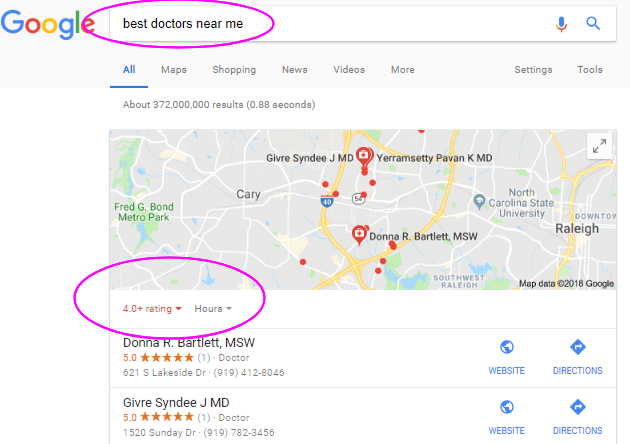High-quality, positive customer reviews will improve your business’s visibility and increase the likelihood that a potential customer will visit your location. – Google My Business
An online review of your business consists of any written sentiment left directly by a customer on any type of platform or website that supports reviews. There are hundreds of reviews sites, many of which are industry-specific, but those that matter most for SEO purposes tend to be Google, Yelp and Facebook.
Some companies overlook customer reviews when building their online presence; they may not appreciate the importance of an online reputation or understand how to navigate the complexities of multiple review sites. It can be a daunting task trying to manage your company’s online reviews since you’re leaving so much in the hands of your customers, but taking action to influence and contribute to building your online reputation is an essential element of marketing.
How search engine results for local businesses are changing
One of the best ways to see how SEO results are affected by reviews online is to take a look at the search engine results for your business category on a mobile device. Typically, the first results are ads, then the local search map pack (generally consisting of the three highest reviewed and closest businesses in that category), followed by organic search results. For most industries, up to 75% of the remaining web results will be taken up by business listing sites like Yelp, Infogroup, SuperPages, Angie’s List or any number of industry-specific listing sites. Only a few actual business websites will make it onto the first page in a keyword search.
These type of results are exactly why managing your online reputation is so important. Businesses need to control their profiles on these sites and actively solicit positive reviews to increase their standings.
How customer reviews affect your search engine rankings

Using “best” in Google searches filters results automatically to 4+ stars
Not only do customers read reviews to determine which businesses to use, but sometimes negative reviews can even prevent consumers from finding your business online. We may never know the exact algorithms Google uses to deliver search engine rankings; however, a 2017 survey of leading SEO experts suggests that review signals factor significantly into the rankings for Google’s local map listings as well as organic search results. Review signals include the quantity, responses, content, diversity and velocity of reviews.
Gaining high-quality reviews is often the only way a business can break into that map pack of local listings outside of sheer proximity. If users qualify their search with “best” or “top,” only businesses that match the search and have a rating of 4+ stars will show up in the map pack. Companies not actively cultivating positive reviews are unlikely to rank among the location listings.
How to manage your business’s online reputation
It’s important to get out in front of any issues and stay on top of your businesses’ online reputation as much as possible. The three most important things a business can do are:
- Monitor your reviews
- Respond to your reviews
- Encourage happy customers to leave reviews
Read the article How to Manage Your Online Reputation to learn more about this process. While this article speaks to medical practices, the overall strategies can work for any type of business.
Positive customer reviews offer a competitive edge
An abundance of positive reviews not only improves your website’s SEO; it also helps attract new customers. The better your reviews, the more prospects you can convert into customers or clients. Dozens of surveys and studies point out the SEO and revenue benefits that come along with a strong online reputation. The infographic below by Invesp presents interesting statistics, insights and tips.
If you need help navigating review sites and developing reputation management strategies for your business, Group3 can help. Contact us to learn more.




